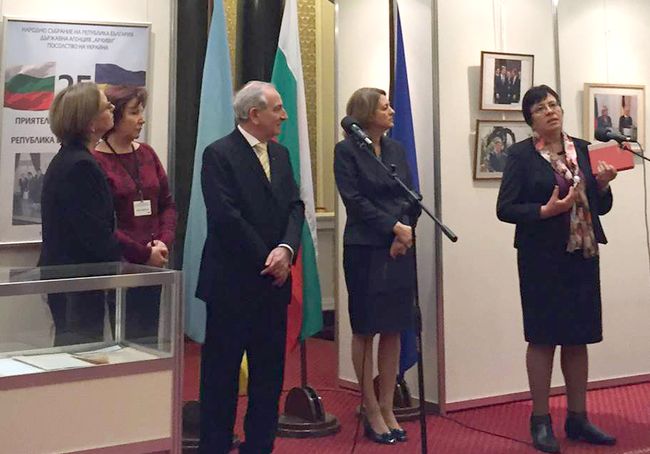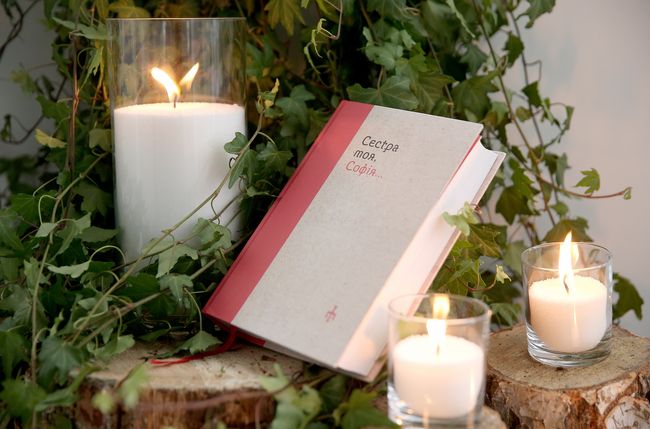Intellectual weapons against myths
The book My Sister Sofia... is presented at the Bulgarian parliament
Hanna Hopko and Svitlana Zalishchuk, MPs and delegates of the Verkhovna Rada Foreign Affairs Committee, returned to Ukraine from Bulgaria. As The Day informed earlier, the delegation had participated in a Bulgarian-Ukrainian parliamentary conference hosted by the Nation Assembly of the Republic of Bulgaria in Sofia and dedicated to the 25th anniversary of resumption of the diplomatic relations between the two countries.
During the visit the participants of the conference signed a joint statement, met with the leaders of the Bulgarian parliament, talked to Ukrainian troops who were poised to return home after a period of rehabilitation, and laid flowers at the memorial plaque on the building of the first Embassy of the UNR to Bulgaria. In the framework of the conference, a unique exposition of archive documents and photographs was opened in the building of the National Assembly. Among the exhibits was the Brest-Litovsk peace treaty of February 9, 1918, sealed with Hetman Pavlo Skoropadsky’s original wax seal with the Ukrainian trident. The document is in cherry condition, and was for the first time exhibited at the Bulgarian parliament. The exposition at the National Assembly will be open for a week.
The UNR and Bulgaria are known to have established diplomatic relations in 1918. And on December 5, 1991 Bulgaria was among the first nations to recognize Ukraine as an independent state. On December 13, the foreign ministers of both countries signed the Protocol of Establishment (in fact, restoration) of diplomatic relations, and on October 1992 Ukraine’s Leonid Kravchuk and Bulgaria’s Zhelyu Zhelev signed the Treaty on Friendly Relations and Cooperation between Ukraine and the Republic of Bulgaria. Today Bulgaria actively supports Ukraine’s sovereignty and territorial integrity, the European integration reforms and Ukraine’s agenda in the EU-Ukraine dialog, and backs the visa-free regime for Ukrainian nationals. Bulgaria was the fourth EU member state to ratify the Association Agreement in 2014.
During the opening of the exhibit Olena Chmyr, associate professor of Slavic Studies at the Institute of Philology of Kyiv Taras Shevchenko National University, and The Day’s correspondent, jointly with Dzhema Grozdanova, chair of the Committee on European Affairs, and Mykola Baltazhy, Ukraine’s ambassador to Bulgaria, presented the new publication from Den’s Library, the book My Sister Sofia..., as well as Ukraine Incognita. TOP 25, and the English language issues of the newspaper, The Day.

Photo by Ruslan KANIUKA, The Day
“The participants of the conference, vice speakers, and MPs were astonished when Olena Chmyr opened her speech in perfect Bulgarian,” commented Hopko to The Day. “She told about the contents of the book and emphasized how important it is to understand that Bulgaria’s history, just like Ukraine’s, was distorted in the time of imperial and Soviet rule. There have been numerous attempts at a sort of ‘hybrid misappropriation’ of our history for centuries on end. The future of Ukraine and Bulgaria, the way we want to see it, must be based on historical truth. That is why Den’s contribution is hard to overestimate. I would like to thank Larysa Ivshyna for My Sister Sofia... – this book must help our diplomats extend their activities, it must become an efficient weapon against the myths imposed by ‘the Russian world.’ This is an important prerequisite for the development of partnership relations between Ukraine and Bulgaria, as well as other countries of south-eastern Europe. I hope that in 2018 we will mark a centennial of the establishing of diplomatic relations both at the Verkhovna Rada and the parliament of Bulgaria. Today I would like to remember the words of the Bulgarian tsar Ferdinand who said that he believed in a prosperous, strong Ukraine.”
Hopko added also that the encounter offered an excellent opportunity to meet with scholars and arrange for new articles and other materials on the Ukraine-Bulgaria relations. “Just like in Ukraine, today in Bulgaria the public embraces national culture,” shares Hopko. “People look for information on Bulgaria and on Ukraine. That is why the parallels highlighted by My Sister Sofia... are of crucial importance. Just like Ukraine, during the last millennium Bulgaria fought for own sovereignty, despite the will of empires. Such an event held at the parliament of Bulgaria is also an instance of our counteraction to Russian propaganda. Today we are two independent nations, and while developing mutual relations we must first of all have our peoples’ best interests at heart. Among the participants there were translators and students of Ukrainian linguistics and culture. They, in particular, emphasized the want of special trainings for translators of Ukrainian. I hope that this initiative will find support within Ukraine’s ministry of foreign affairs. It is of crucial importance for the spreading and developing of our identity, culture, and language.”
Chmyr says that she only had some 10 minutes to present My Sister Sofia..., but it proved enough to get the potential readers interested. “We discussed national catastrophes, the importance of Bulgarian experience for Ukraine, and the enlightening motives of the book’s authors. The audience was well prepared: politician Luchezar Toshev, leading expert of the commission on foreign policy and honorable associated member of PACE and a co-organizer of the exhibit, scholars and experts on Ukrainian history, and Bulgaria’s first ambassador to Ukraine Peter Markov. One copy of the book I presented to Dzhema Grozdanova, chair of the parliamentary commission on foreign policy,” shares Chmyr. “All in all, the Bulgarian party was represented on a high level. There were also officials who, in their time, passed the decision to recognize Ukraine’s independence. My Sister Sofia... awakened great interest. I told that this book about Bulgaria is written by leading Ukrainian scholars, historians, and public activists. Now it would be good if a similar publication on Ukraine would be written by Bulgarians. I threw down a virtual glove, and my interlocutors assured they accepted the challenge.”
Chmyr told that the Bulgarian counterparts shared about Russian influences in the country via capital and media which are active in Bulgaria. They are aware of those challenges. Moreover, all of them emphasized the difficulty of the current moment both for Bulgaria and the world as a whole. They also proposed to prepare a series of exhibits to commemorate the centennial in 2018. Ukrainian museums and archives preserve several artifacts which are very important for Bulgarians. Likewise, Bulgarians have many exhibits dating back to the UNR period. “Dr. Rayna Kamberova, lecturer at the Ukrainian Linguistics, Sofia University “St. Kliment Ohridski,” is already working on the translation of the foreword to My Sister Sofia...,” says Chmyr. “There is a suggestion to publish a translation completed with texts in Bulgarian. This issue needs to be agreed with the publishers and authors of the book. Just as I said, there is a lot of interest in the book: the copies we had brought were gone in no time.”
Newspaper output №:
№78, (2016)Section
Society





